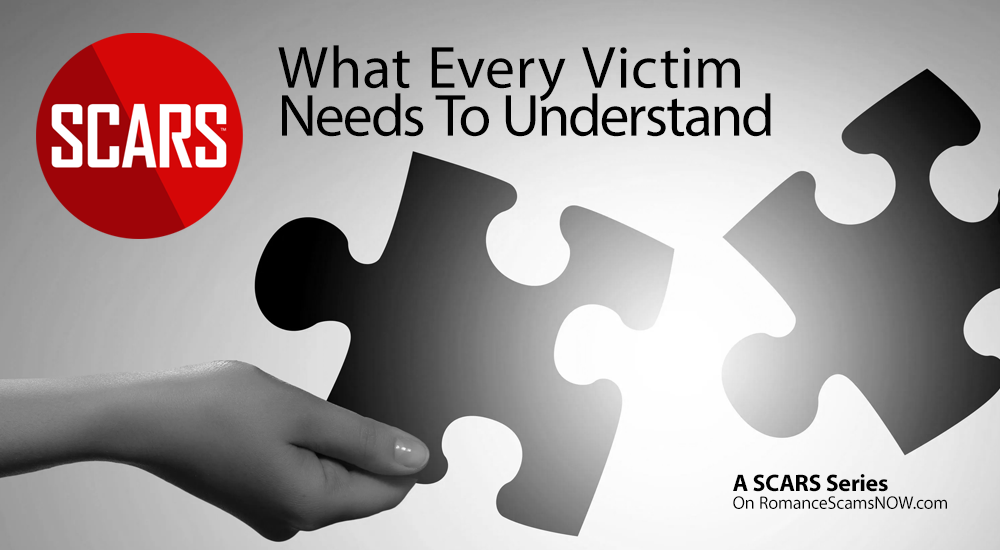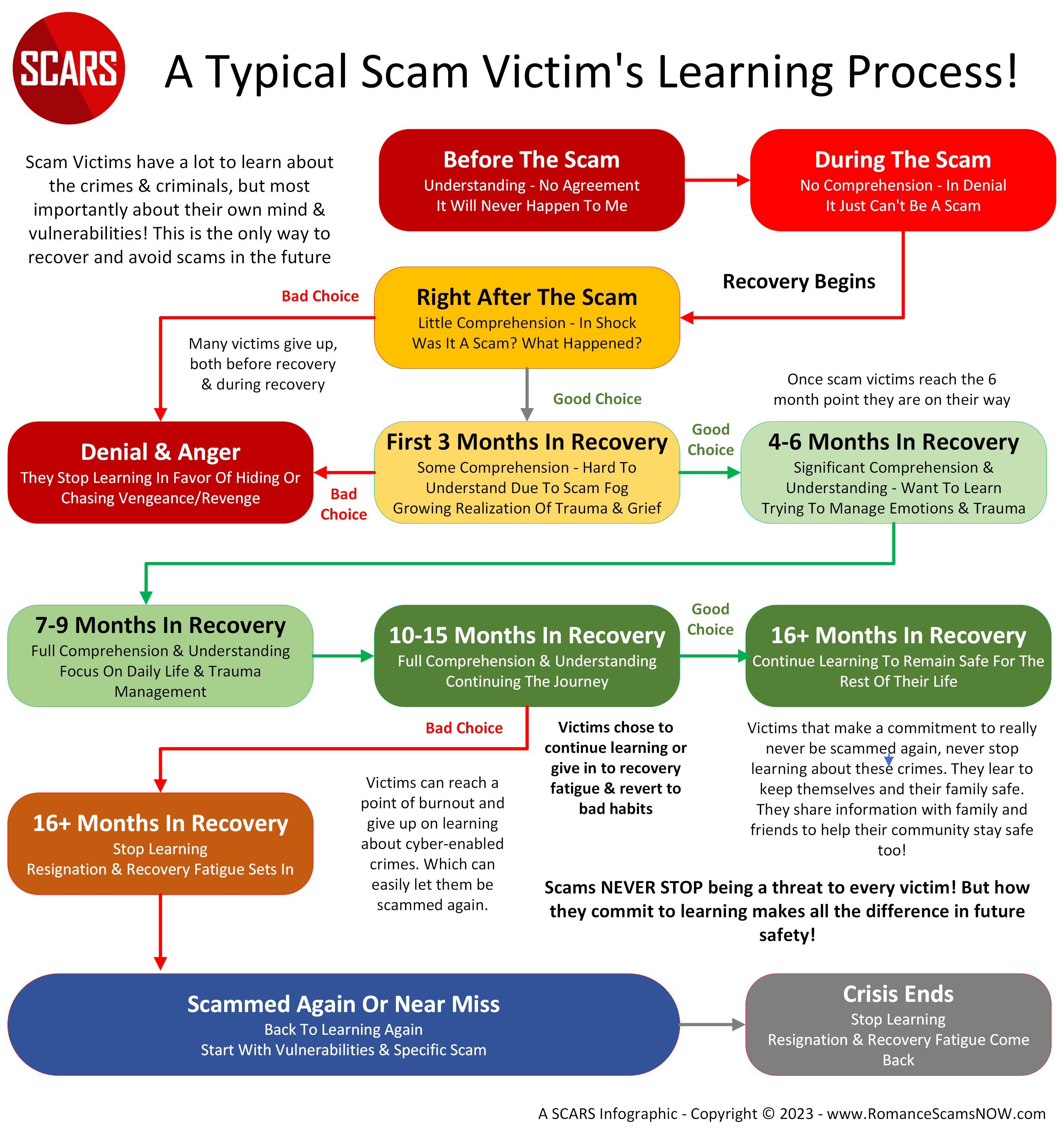The Learning Process: How Scam Victims Learn Before & After Their Scam Ends.
Here We Show How That Victim Learning Process Works – For Good And Bad!
After the scam, most scam victims begin to realize how ignorant they were about scams and scammers. Many had no idea these types of crimes even existed. Many had little or no interest in gaining knowledge through a learning process about these crimes.
Why Are So Many Victims Ignorant Of These Crimes?
First, let us say that when we say victims are ignorant that this is not blaming them in any way. None of us know what we don’t know. However, we do live in a world full of predators, so it seems a poor choice to not accept that and learn about it.
Our goal at SCARS is to fully understand the scam victims’ learning process and in fact all aspects of the criminology and victimology of the crimes and their victims.
So why do so many people avoid learning about these crimes that can impact them, their friends, and their families at any time?
There could be several reasons why people avoid learning about crimes that can impact them at any time. Here are a few possible explanations:
- Fear and Anxiety: Learning about crimes can make people feel anxious and fearful, which can be uncomfortable and unpleasant. Some people may avoid learning about crimes because they do not want to experience these negative emotions.
- Denial: People may choose to ignore the possibility of crime because they believe it will not happen to them. This can be a form of denial and may be a way to cope with the uncertainty and unpredictability of life.
- Trust in Others: Some people may have a strong belief in the goodness of others and trust that they will not be victims of crime. This can be a positive outlook on life, but it may also be unrealistic.
- Time and Priorities: Learning about crime and safety may not be a top priority for some people, and they may not have the time or resources to devote to it. They may feel that there are other more pressing concerns that require their attention.
- Overwhelmed by Information: There is a vast amount of information available on crime and safety, and it can be overwhelming for some people. They may not know where to start, or they may feel that they cannot process all the information effectively.
The reasons why people avoid learning about crimes (such as relationship scams) that can impact them can be complex and multifaceted. Further study is needs to better undersand scam victims and the learning process.
Why Scam Victims Are More Attracted To Urban Legends?
After a scam ends, scam victims often ignore a more orderly learning process and desperately want to learn about scammers in order to protect themselves from falling prey to similar schemes in the future. However, they may find themselves more attracted to urban legends than to the real facts about scams and scammers.
One reason for this is that urban legends often have a more sensational and captivating story than dry facts about scams. For example, an urban legend about a person who lost all their life savings to a scam may have more emotional appeal than a factual account of how scammers operate and how to avoid them.
Another reason is that urban legends can be more relatable and easier to understand than the technical details of scams. People may feel overwhelmed by the complexity of scams and the many different tactics used by scammers. Urban legends, on the other hand, often present a clear and simple story that people can easily grasp.
In addition, urban legends can play into people’s fears and anxieties, which can make them more compelling. For example, an urban legend about a scammer who preys on the elderly may resonate with people who worry about their elderly loved ones falling victim to scams or who are themself elderly and was a victim of such a criminal.
Despite these factors, it is important for scam victims to focus on their learning process and real scams and scammers rather than getting caught up in urban legends. While urban legends may be entertaining and emotionally satisfying, they do not provide the necessary information to protect oneself from actual scams. Learning about the warning signs of scams, how scammers operate, and how to protect oneself can help prevent future victimization.
Why Do Scam Victims Stop Or Give Up On The Learning Process?
After falling victim to a scam and the immediate threat has passed, some scam victims may stop or give up on learning more about scams and scammers.
Here are a few possible reasons why:
- Relief and Denial: Once the immediate threat has passed and the victim has recovered from the initial shock, they may feel relieved and want to move on from the experience. They may not want to dwell on the scam and may even try to deny that it happened.
- Shame and Embarrassment: Scam victims may feel ashamed and embarrassed that they fell for a scam. This can make them hesitant to talk about the experience or seek help, which can also prevent them from learning more about scams and how to avoid them in the future.
- Lack of Trust: After being scammed, some victims may lose trust in others, including those who are offering information or assistance related to scams. They may be hesitant to trust anyone, including legitimate sources of information on scams and scammers.
- Overwhelmed: Learning about scams and scammers can be overwhelming and time-consuming. Scam victims may be dealing with other issues related to the scam, such as financial and emotional fallout, which can make it difficult to find the time and energy to learn more about scams.
- Sense of Powerlessness: Some scam victims may feel powerless and helpless after being scammed. They may believe that they cannot protect themselves from future scams, which can make it difficult to find the motivation to learn more about scams and scammers.
- Recovery Fatigue: learn more about that here.
While these factors may make it difficult for scam victims to continue learning about scams and scammers after the immediate threat has passed, it is important for them to do so. Learning about scams and scammers can help prevent future victimization and may even empower them to take action against scammers. Seeking out reputable sources of information, such as government consumer protection agencies and SCARS, are good starting points for victims who want to learn more.
The Importance Of The Learning Process For Every Crime Victim!
Learning is crucial for every crime victim, as it can help them recover from the trauma of the crime and prevent future victimization.
Here are some reasons why learning is important for crime victims:
- Understanding the Crime: Learning about the details of the crime can help victims make sense of what happened to them. It can also help them better understand the motivations of the perpetrator and how the crime could have been prevented.
- Coping with Trauma: Many crime victims experience trauma, which can have long-lasting effects on their mental health and wellbeing. Learning about trauma and how to cope with it can help victims manage their emotions and begin the healing process.
- Preventing Future Victimization: Learning about crime prevention can help victims protect themselves and their loved ones from future victimization. This may involve learning about safety tips, self-defense techniques, and how to spot warning signs of potential criminal activity.
- Seeking Justice: Victims of crime may be motivated to seek justice by holding the perpetrator accountable for their actions. Learning about the criminal justice system and victims’ rights can help them navigate the legal process and advocate for their rights.
- Empowerment: Learning about crime and victimization can empower victims to take control of their lives and move forward after a traumatic event. By gaining knowledge and skills related to crime prevention, safety, and coping with trauma, victims can regain a sense of control over their lives.
Learning is an essential component of recovery and future prevention for crime victims. It can help them understand the crime, cope with trauma, prevent future victimization, seek justice, and feel empowered.
-/ 30 /-
What do you think about this?
Please share your thoughts in a comment below!
Do You Need Support?
Get It Now!
SCARS provides the leading Support & Recovery program for relationship scam victims – completely FREE!
Our managed peer support groups allow victims to talk to other survivors and recover in the most experienced environment possible, for as long as they need. Recovery takes as long as it takes – we put no limits on our support!
SCARS is the most trusted support & education provider in the world. Our team is certified in trauma-informed care, grief counseling, and so much more!
To apply to join our groups visit support.AgainstScams.org
We also offer separate support groups for family & friends too.
Become a
SCARS STAR™ Member
SCARS offers memberships in our STAR program, which includes many benefits for a very low annual membership fee!
SCARS STAR Membership benefits include:
- FREE Counseling or Therapy Benefit from our partner BetterHelp.com
- Exclusive members-only content & publications
- Discounts on SCARS Self-Help Books Save
- And more!
To learn more about the SCARS STAR Membership visit membership.AgainstScams.org
To become a SCARS STAR Member right now visit join.AgainstScams.org
To Learn More Also Look At Our Article Catalogs
Scam & Crime Types
More SCARS
- ScamsNOW Magazine – ScamsNOW.com
- ContraEstafas.org
- ScammerPhotos.com
- AnyScam.com – reporting
- AgainstScams.org – SCARS Corporate Website
- SCARS YouTube Video Channel














Leave A Comment